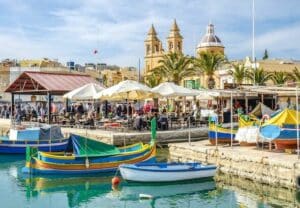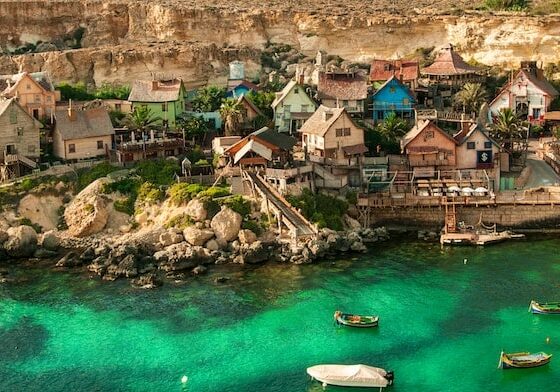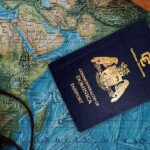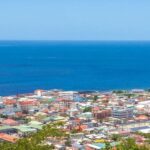The Maltese passport is a key biometric document issued for Maltese citizens. Since Malta is part of the European Union, a Maltese passport is essentially an EU passport; therefore, you have the same rights as all other EU citizens. Maltese passport holders have the right to live, work, and study in any country within the EU, with full freedom of movement and residence rights. The passport provides visa-free travel to 172 countries, which includes the EU’s Schengen zone and most countries in Asia, the Americas, and Africa.
This guide provides in-depth information on owning a Maltese passport and the advantages that come with it.
Key Facts about the Malta Passport
Schengen privileges
Malta is one of 27 countries forming the Schengen Area. As such, Maltese citizens do not require passports to enter other Schengen countries, such as Portugal, Spain, Germany, and France.
Malta is also a member of the European Union, and the Maltese passport shares a similar burgundy design to other passports issued by EU nations.
Global ranking
Malta’s passport ranks 34th out of 199 on our Global Passport Index, assessing mobility (i.e., travel benefits afforded to the holder), investment and business opportunities, and the country’s quality of life.
Passport types
The Malta Passport Office issues three types of passports to ordinary citizens:
Adult passports: Issued to Maltese citizens aged 16 and over
Minor passports: Issued to Maltese citizens between 6 and 13
Minor passports: Issued to Maltese citizens aged 5 and under
The Passport of the Sovereign Military Order of Malta is an official travel document issued to officials and diplomats representing the Sovereign Military Order of Malta (SMOM). There are two types of SMOM passports:
Diplomatic passports: Issued to individuals officially representing the Order’s diplomatic corps (heads and members of diplomatic missions overseas as well as their spouse and minor children)
Service passports: Issued to individuals in charge of a special mission within the Order, with validity strictly tied to the duration of the assignment.
Malta Passport Benefits

Malta’s passport power gets you:
European citizenship: Acquiring Maltese citizenship means you acquire citizenship of the European Union. This provides several benefits to Maltese citizens, which include ease of business across multiple countries and enhanced consumer protection.
Freedom of movement in the European Union: Malta is a member of the EU, so Maltese citizenship grants you the privilege to travel, reside, work, and pursue studies across the entire European Union. Maltese citizens can quickly obtain a valid residence card for any EU country and possess the right to expedited naturalization in EU countries like Italy.
Visa-free travel: Besides freedom of movement throughout the European Union, Maltese passport holders can travel visa-free to over 170 countries worldwide, including the US, Canada, and the UK.
Access to high-quality schooling: EU citizens and their family members can study in any EU member state under the same conditions as local students. This allows Maltese citizens to pursue educational opportunities and research collaborations in Europe’s top universities and institutions. Additional sponsorship and funding programs accessible to EU citizens accompany access to an expanded range of educational opportunities.
Access to top-rated healthcare: The highly-rated Maltese healthcare system is free for all citizens in Malta. Maltese passport holders can also obtain a European Health Insurance Card (EHIC) available to EU citizens, which allows them to seek free emergency medical care in all EU countries.
Safe investments: With a stable economy and political neutrality, Malta offers a secure and reliable investment environment. The Maltese government enforces a robust legal framework that further reinforces investor protection and stability.
Special tax concessions: Malta’s favorable tax system includes no gift, wealth, or inheritance tax. Maltese nationals only pay tax on Malta-sourced income, and capital gains arising from outside Malta are also tax-free. Malta’s extremely advantageous tax exposure includes several double taxation treaties, with countries like the US, the UK, and all EU countries, that eliminate unfavorable tax consequences and risks.
Global Visa Requirements for Maltese Passport Holders
This powerful EU passport allows holders to enjoy an array of unique benefits, including the opportunity to live in Malta. Gloriously located in the Mediterranean Sea, this tiny island country is known for its pleasant climate, friendly people, low crime rate, and great quality of life. It’s, overall, an alluring place to base yourself in Europe.
As a Maltese citizen, you can visit countries on every continent visa-free, with a visa-on-arrival, or with an eTA (Electronic Travel Authorization).
Let’s take a closer look at the countries accessible to Maltese citizens.
| Country | Malta |
|---|---|
| visa free (90 days) | |
| visa required | |
| visa free | |
| visa free (30 days) | |
| visa free (180 days) | |
| visa free (90 days) | |
| visa free (180 days) | |
| e-visa | |
| visa free | |
| e-visa | |
| visa free (90 days) | |
| visa on arrival | |
| visa on arrival | |
| visa free (90 days) | |
| visa free (30 days) | |
| visa free | |
| visa free | |
| e-visa | |
| e-visa | |
| visa on arrival | |
| visa free (90 days) | |
| visa free (90 days) | |
| visa free (90 days) | |
| visa free (90 days) | |
| visa free | |
| visa on arrival | |
| visa on arrival | |
| visa on arrival | |
| e-visa | |
| e-visa | |
| visa free (30 days) | |
| visa required | |
| visa required | |
| visa free (90 days) | |
| visa required | |
| visa free (90 days) | |
| visa on arrival | |
| visa required | |
| e-visa | |
| visa free (90 days) | |
| e-visa | |
| visa free | |
| visa required | |
| visa free | |
| visa free | |
| visa free | |
| e-visa | |
| visa free (180 days) | |
| visa free | |
| visa free (90 days) | |
| visa on arrival | |
| visa free (90 days) | |
| e-visa | |
| visa required | |
| visa free | |
| visa free (30 days) | |
| visa on arrival | |
| visa free (120 days) | |
| visa free | |
| visa free | |
| visa free (30 days) | |
| visa free (90 days) | |
| visa free (360 days) | |
| visa free | |
| visa required | |
| visa free | |
| visa free (90 days) | |
| visa free (90 days) | |
| e-visa | |
| visa on arrival | |
| visa required | |
| visa free (90 days) | |
| visa free (90 days) | |
| visa free (90 days) | |
| visa free | |
| visa free | |
| e-visa | |
| visa on arrival | |
| e-visa | |
| visa on arrival | |
| visa free | |
| visa free (90 days) | |
| visa free | |
| visa free | |
| visa free (90 days) | |
| visa on arrival | |
| visa free (30 days) | |
| e-visa | |
| visa required | |
| visa free (90 days) | |
| visa on arrival | |
| visa free (60 days) | |
| visa on arrival | |
| visa free | |
| visa on arrival | |
| visa required | |
| visa required | |
| visa required | |
| visa free | |
| visa free | |
| visa free | |
| visa free (90 days) | |
| visa on arrival | |
| visa on arrival | |
| visa free (90 days) | |
| visa on arrival | |
| visa required | |
| visa free (90 days) | |
| visa on arrival | |
| visa free (90 days) | |
| visa free (180 days) | |
| visa free (90 days) | |
| visa free (90 days) | |
| visa free | |
| visa free (30 days) | |
| visa free (90 days) | |
| visa free (90 days) | |
| visa on arrival | |
| e-visa | |
| visa required | |
| visa required | |
| visa on arrival | |
| visa free | |
| e-visa | |
| visa free (90 days) | |
| visa required | |
| e-visa | |
| visa required | |
| visa free (90 days) | |
| visa free | |
| visa on arrival | |
| e-visa | |
| visa free (90 days) | |
| visa free | |
| visa free (90 days) | |
| e-visa | |
| visa free (90 days) | |
| visa free (90 days) | |
| visa free (30 days) | |
| visa free | |
| visa free | |
| visa on arrival | |
| visa free | |
| e-visa | |
| visa on arrival | |
| visa free (90 days) | |
| visa free (90 days) | |
| visa free (90 days) | |
| visa free | |
| visa free (15 days) | |
| visa on arrival | |
| visa free (90 days) | |
| visa free (90 days) | |
| visa free (90 days) | |
| visa on arrival | |
| visa free (90 days) | |
| visa free | |
| visa free | |
| visa free (90 days) | |
| visa on arrival | |
| visa free (90 days) | |
| e-visa | |
| e-visa | |
| visa free | |
| e-visa | |
| visa free (90 days) | |
| visa required | |
| visa required | |
| visa free | |
| visa free | |
| visa required | |
| visa free (90 days) | |
| visa on arrival | |
| visa free (90 days) | |
| visa on arrival | |
| visa free (90 days) | |
| visa on arrival | |
| visa free (90 days) | |
| visa free (90 days) | |
| visa free (90 days) | |
| visa required | |
| visa free (90 days) | |
| visa free (90 days) | |
| visa free (90 days) | |
| visa free (90 days) | |
| visa free (90 days) | |
| visa free (180 days) | |
| e-visa | |
| visa free (90 days) | |
| visa free (30 days) | |
| visa free (90 days) | |
| visa free | |
| visa free (90 days) | |
| e-visa | |
| visa required | |
| visa free (90 days) | |
| visa free (90 days) | |
| visa required |
Malta Passport Cost
Malta Passport Through Investment

Investors must make an exceptional investment through a real estate investment and philanthropic donation to an approved organization or society. After making the investment and passing a four-tier due diligence process, investors gain the right to obtain a Maltese passport.
Since 2014, Malta has provided citizenship by nationalization to qualifying foreign investors who invest substantially in the Maltese economy. The plan calls for a donation, in addition to the initial investment, of at least €600,000 and a three-year residency requirement, or €750,000 and a 12-month residency requirement in rare cases.
Malta Passport Price
When applying for the passport, there is a fee of €500 per applicant.
Malta Passport Requirements
A Malta passport application is assessed and ultimately approved by the federal government agency, Identity Malta. Among the specific requirements, applicants must prove that they have established honest links with Malta and must take the Oath of Allegiance to get citizenship and a Maltese passport.
The application process and Malta passport photo size requirements also include the following:
- A completed Form A (passport application form) submitted to the Passport Office
- Facial image, signature, and fingerprint biometric data submitted to the Passport Office
- Two passport-size photos
Since 2008, the Maltese Passport Office has issued biometric passports in Malta in compliance with international standards and directives. These documents contain facial imagery, signature, and fingerprint biometrics held securely – in a chip embedded in the passport.
How to get a Malta passport?
Getting a passport is a simple procedure. However, the due diligence aspect can be challenging. If you meet the requirements, you can be granted citizenship and a passport after just 12 or 36 months of residence in Malta.
There are several ways to obtain Maltese citizenship, depending on your situation and objectives.
- You’re entitled to Maltese citizenship by descent if you have an ascendant in the direct line and a parent who is a Maltese national.
- You’re entitled to Maltese citizenship by marriage if you have a Maltese spouse and have lived in Malta for five years.
- You’re entitled to Maltese citizenship by naturalization if you have legally resided in Malta for at least four years starting from the previous seven years.
- You’re entitled to Malta citizenship by naturalization by way of investment after 12 months or three years of residing in Malta.
Malta citizenship by descent
A person born in Malta could obtain citizenship by birthright if one of their parents was a Maltese citizen at the time of birth. A person born outside Malta could obtain citizenship by descent if one of their parents was a Maltese citizen by birth or naturalization.
There are exceptions depending on when you were born. Refer to the Maltese Citizenship Act for more accurate information on Maltese citizenship by descent laws.
Malta citizenship by investment
Malta’s citizenship by investment program – more accurately referred to as the Maltese Citizenship Act Granting of Citizenship for Exceptional Services Regulations (CES) – is a Maltese citizenship program based on naturalization that provides qualifying investors with the opportunity to obtain passports for themselves and their family members, provided that they make a real estate investment, as well as financial contributions to a government fund and an investment in government-approved bonds.
Malta citizenship by investment is one of the most popular in Europe primarily because of the host of benefits it provides to investors, as well as the short timeframe within which you can get a new passport.
How to get a Maltese passport by investment
Applications for the Maltese citizenship scheme are carefully examined and evaluated through a four-tier due diligence process. Depending on the invested sum, applicants who meet the program’s requirements will receive citizenship within 12 or 36 months of residency in Malta and acquire the right to become Maltese passport holders.
To gain eligibility for the Citizenship by Naturalization for Exceptional Services by Direct Investment (CES) program, you must:
- Be over 18 years of age
- Not be from a country on the list of “prohibited” countries
- Have a clean criminal record (the Malta Government conducts extensive criminal checks with INTERPOL, the International Criminal Court)
- Invest at least €600,000 (about $646,000) to receive citizenship status in 36 months or at least €750,000 ($808,000) to receive citizenship status in 12 months
- Donate €10,000 ($10,800) to a Malta-registered organization approved by the Community Malta Agency (CMA)
- Either place €700,000 (about $750,000) in the purchase of a Maltese real estate property or rent one for at least €16,000 (about $17,200) per year over five years
- Submit a valid Malta residency card as proof of your residency
Process of getting a Maltese passport by investment
There are four steps in obtaining a Maltese passport and citizenship through the Maltese Citizenship by Naturalization for Exceptional Services by Direct Investment (CES) program.
Maltese residency
To get residency in Malta, the primary applicant and any dependents included in the application must first apply for a Maltese residence card. They must first pass the CMA’s extensive due diligence assessment to obtain the residence permit.
If the residency application is accepted, you will be issued a resident card with a 36-month validity period. Following that, you’ll visit Malta (excluding young children) to give biometric data for the residency card. You must first lease an apartment before submitting your residency application.
Payment: You must pay €10,000 for the residence permit to get the residency secured. Application fees from the government are €5,000 (about $5,400) for primary applicants and €1,000 for dependents, in addition to a €27.50 (about $30) residency card fee per applicant.
Citizenship eligibility
Applicants must submit a citizenship eligibility application to the CMA within 12 months, starting from the date of issuance of the residence card. Failure to submit the application within this period will result in the revocation of the card.
The CMA conducts due diligence to ensure that the application is completed correctly, and they may also require additional information. The CMA then applies to the relevant Maltese Minister, who decides if the applicants are eligible to seek citizenship.
On average, the citizenship application is processed within 120 to 150 calendar days. You will begin the naturalization process if you are deemed eligible, and you will be given a Letter of Approval in Principle, after which you must pay the additional payments.
Payment: Due diligence expenses are €5,000 for the primary applicant, €15,000 ($16,000) for the benefactor (if applicable) and €10,000 for each dependent aged 13 and above (paid directly to the Agency). You must also pay a €1,000 ($1,080) admin fee per applicant.
Citizenship
Depending on your investment, you can apply for Malta citizenship to the CMA after 12 or 36 months of stay. The CMA updates its due diligence on the applicants and presents the Minister with its final conclusions. Citizenship is awarded once the Minister has approved the application.
From the date of approval, the processing period for obtaining citizenship is around two to three months. If the citizenship application is granted, the main applicant must fulfill the required investment, donation, and property criteria to begin the naturalization process.
Payment: A €500 (about $540) admin fee per applicant, paid directly to the Agency.
Naturalization
After completing all the investment criteria, the applicant will be invited to take the Oath of Allegiance. The Oath must be taken within six months after the Letter of Approval in Principle date.
Applicants are granted Maltese citizenship and a Certificate of Naturalization. Every year, the names of all naturalized citizens are published in the Government Gazette.
The CMA performs continual surveillance for five years. Non-compliance with the program’s terms and conditions could lead to the withdrawal of your citizenship.
Payment: Government Direct Investment–€600,000 or €750,000 for the main applicant (plus €50,000 ($54,000) for each dependent), and a €10,000 charitable donation. There is also a residential property lease for a minimum of €16,000 per year for five years or a real estate purchase for a minimum of €700,000 to be held for at least five years.
For more information about Malta’s second citizenship requirements, take a look at our ultimate guide about Malta citizenship by investment.
Processing Time for Maltese Citizenship by Naturalization for Exceptional Services by Direct Investment

If you meet all the necessary criteria, they will submit your eligibility application. They will carry out further verification stages (two to four) and submit it to the relevant Maltese ministers, who will check before deciding regarding your qualifications.
After you’ve fulfilled the investment requirements, you must also have resided in Malta for at least 36 months – or 12 months, depending on the invested sum – before you can apply for Malta citizenship. Obtaining a Letter of Approval in Principle takes two to three months. You must then take the Oath of Allegiance to receive an official naturalization certificate. Agents from the Community Malta Agency will monitor all successful applicants for five years after citizenship has been granted.
Dual Citizenship in Malta
Malta accepts dual citizenship. This means that you can acquire Maltese nationality and maintain your original citizenship. However, it’s essential to check the laws of your place of origin to confirm whether dual citizenship rights apply in your case. If you can’t hold dual citizenship status in your native country, you might have to renounce your primary citizenship to obtain citizenship in Malta.
Maltese Passport Renewal
After obtaining your Maltese passport, you are entitled to retain it throughout your lifetime, with the condition that it is renewed every ten years. It’s worth noting that Maltese passports incorporate biometric features.
Maltese Passport Prices
If you apply for citizenship in Malta by investment, you will have to set aside at least €600,000 for the application sum, not including other costs such as the required real estate investment, philanthropic donation, and fees for background checks and legal services. The cost of a passport for an adult is €70 (about $75) if applying between September and March and €80 if applying between August and April. The passport cost for a minor is €40 (about $43), while the price for a child under ten is €16 (about $17).
Under certain circumstances, you can request an urgent passport in Malta. The Passport Office provides a 24-hour service to those requiring an emergency passport, which can be issued within four hours for special reasons. If this is the case, you are required to contact the Immigration Authorities at the Malta International Airport on 2122 2941. It is worth noting that this expedited service comes at a higher cost and is available only in specific cases.
Do I need to stay in Malta?
Applicants of Malta’s citizenship by investment scheme must provide evidence of a bona fide connection to the country. This means that investors must establish residence for at least 12 months before applying for the program, which entails purchasing or leasing an apartment. If investors intend to rent a property long-term, they must be able to provide a copy of the lease agreement and proof of being resident in Malta for at least 183 days of the year.
Is it worth having a Maltese passport?
If you are looking for global mobility for yourself and your family, tax exemptions, or a beautiful place to live or retire, the Maltese passport is a fantastic asset to have.
If you would like to discuss your options, we have knowledgeable consultants in investment migration available to assist you today. Whether you are considering Malta’s investment scheme or other citizenship by investment programs, like Turkey citizenship by investment, our customized approach ensures that we guide you through each phase of the process.
Frequently Asked Questions about the Malta passport
How much is a Maltese passport?
If you are interested in investing in Malta to acquire a second passport within a relatively short period, the minimum investment amount to obtain citizenship is €600,000 plus costs. After you’ve purchased a property for €700,000 or leased a property for €16,000 per year for five years, and made a charitable donation of €10,000, you can be granted citizenship and acquire a passport for €70.
Can you visa-free travel with a Malta second passport to more than 130 countries?
You can enjoy visa-free acess to 172 destinations worldwide, including the EU Schengen Area, the UK, Canada, and the US.
Is the Malta passport biometric?
Malta has a biometric passport requiring applicants to submit biometric data to receive one.
What is the Malta passport price?
If you apply for citizenship in Malta by investment, you will have to set aside at least €600,000 for the application sum, not including other costs such as the required real estate investment and fees for background checks and legal services. The Malta passport price for an adult is €70 if applying between September and March and €80 between August and April. The passport cost for a minor is €40 (€16 for children under ten).
Under certain circumstances, you can request an emergency passport that can be issued within four hours. It is worth noting that this expedited service comes at a higher cost and is available only in specific cases.
How to get Malta citizenship by investment?
Malta’s investment citizenship program, which granted a passport to investors willing to pay €1.2 million (about $1.29 million), has been surrounded by controversy since its introduction. The Maltese government has enacted a new citizenship program with an enhanced due diligence process and more stringent prerequisites to obtain Malta dual citizenship by naturalization.
To qualify for this Malta immigration investment program, foreign nationals must significantly contribute to the country’s national development. The investment amount must add up to a minimum of €600,000. The investment options include:
- An exceptional direct investment of at least €600,000 or €750,000, depending on the residence period selected
- An investment of €700,000 in residential real estate or a five-year rental agreement with a minimum value of €16,000 per annum
- A compulsory donation of €10,000 to a registered cultural, sport, scientific, animal welfare, or artistic non-governmental approved organization or society
What is Malta citizenship by the investment cost?
The Malta citizenship by investment program is no longer in operation; however, the new Malta citizenship program – officially called the Malta Citizenship by Naturalization for Exceptional Services by Direct Investment program (CES) – allows foreigners to be eligible for a Malta passport by investment, provided they fulfill the program’s strict eligibility criteria.
The minimum amount to invest is €600,000 plus a real estate purchase of €700,000 or a five-year lease agreement of €16,000 per annum, as well as a donationation of €10,000. This excludes the processing fees, due diligence background check, legal, and passport application fees.
Is Malta a strong passport?
Malta’s passport ranks 34th out of 197 countries on the Global Passport Index. With its membership in the EU and participation in the Schengen Area, Malta’s passport offers significant advantages in terms of travel and business mobility.
How many countries can you visit with a Maltese passport?
The Maltese passport currently ranks 34th place according to the Global Citizen Solutions Global Passport Index. It provides visa-free access to 172 destinations, which makes it one of the most attractive passports in the world, with a high mobility score.
Which countries are visa-free with a Malta passport?
The Malta passport affords visa-free access to 172 countries, including but not limited to the EU’s Schengen Zone, plus many countries in the Americas, Asia, and Africa. That said, perhaps the greatest selling point of a Maltese passport is that Maltese citizens are free to travel to the EU, Schengen Area, and the United Kingdom.
Is it easy to get a Maltese passport?
The process is quite straightforward: A four-tier due diligence procedure is used to verify and assess the application for Malta Citizenship by Investment, and if you match the qualifications for this program, you will be given citizenship and a passport after just 12 or 36 months of residency in Malta.
Do US citizens need a visa to enter Malta?
No. US citizens can enter Malta for up to 90 days for tourist or business purposes without a visa. Please note that the passport should be valid for at least three months beyond the planned departure date.



